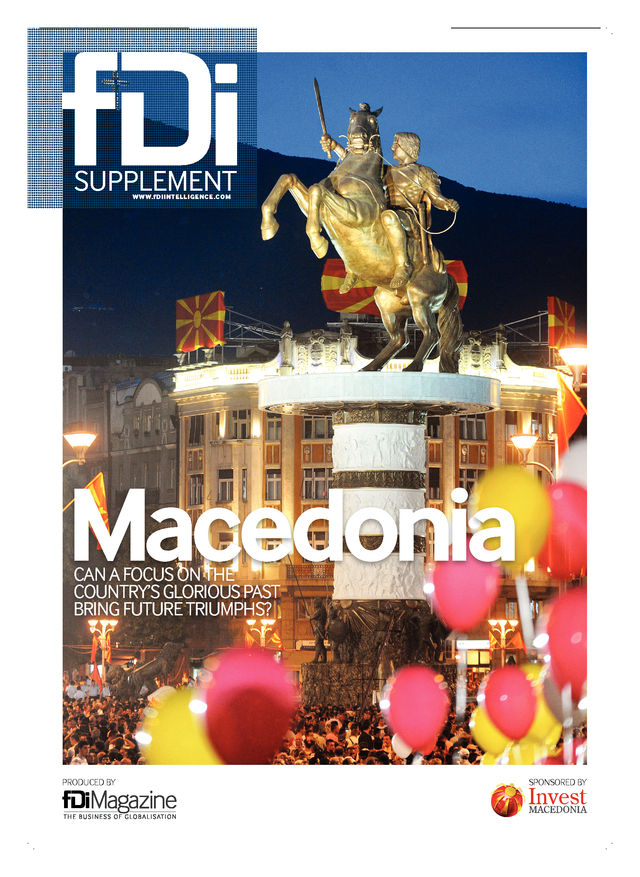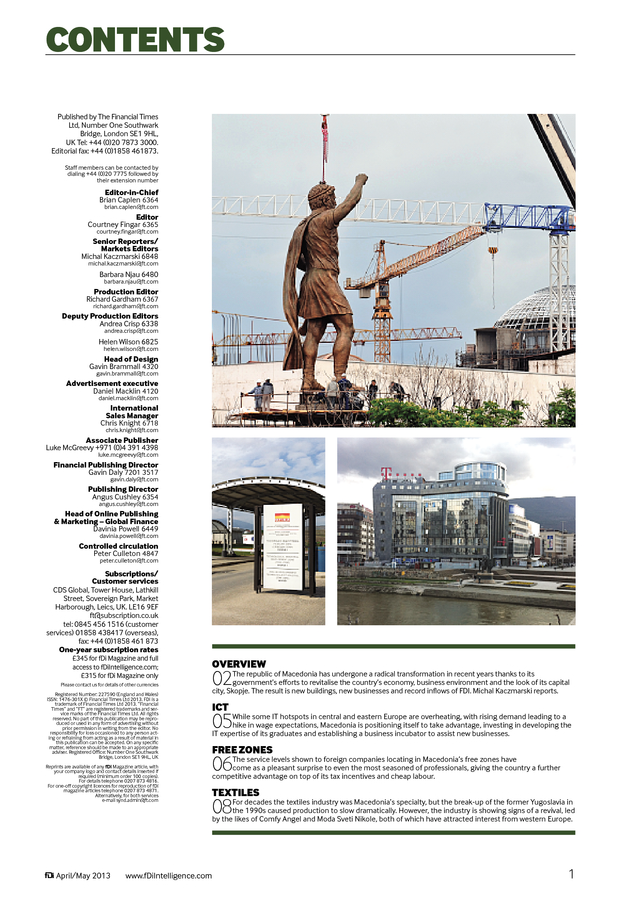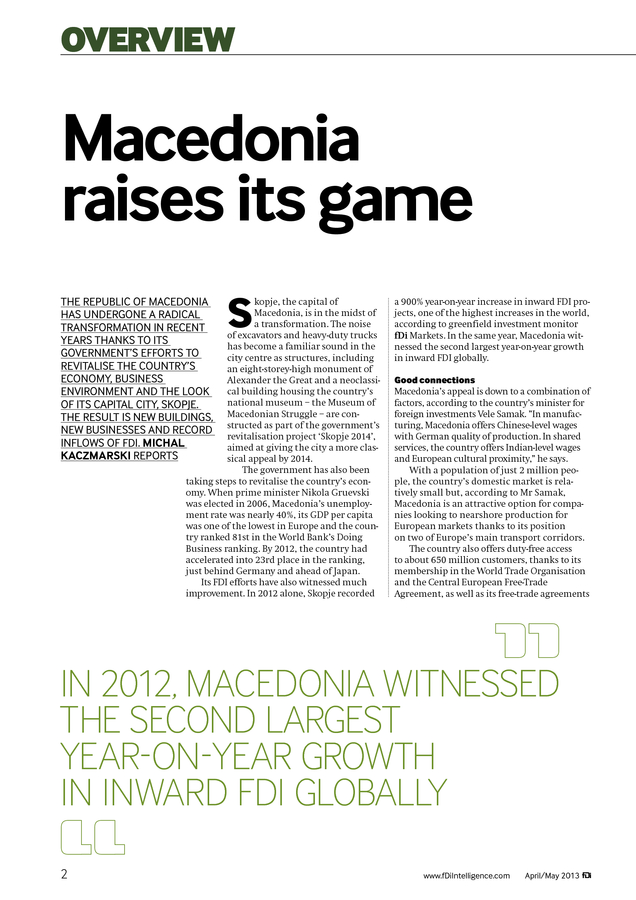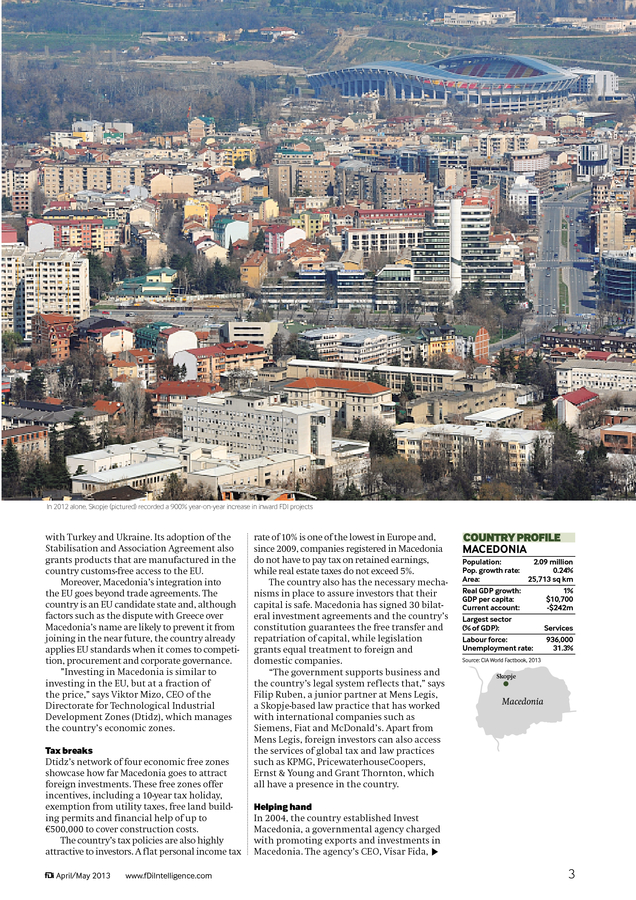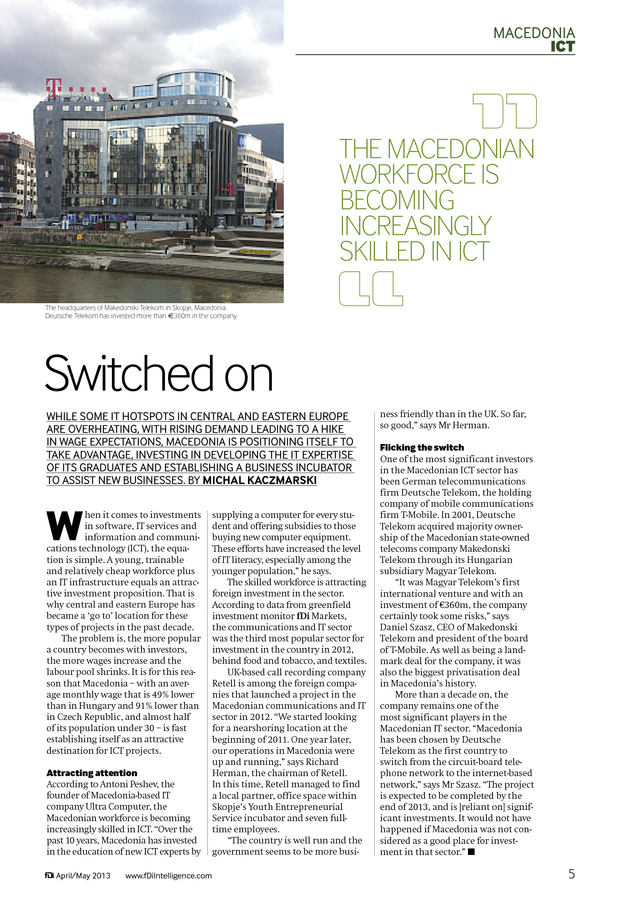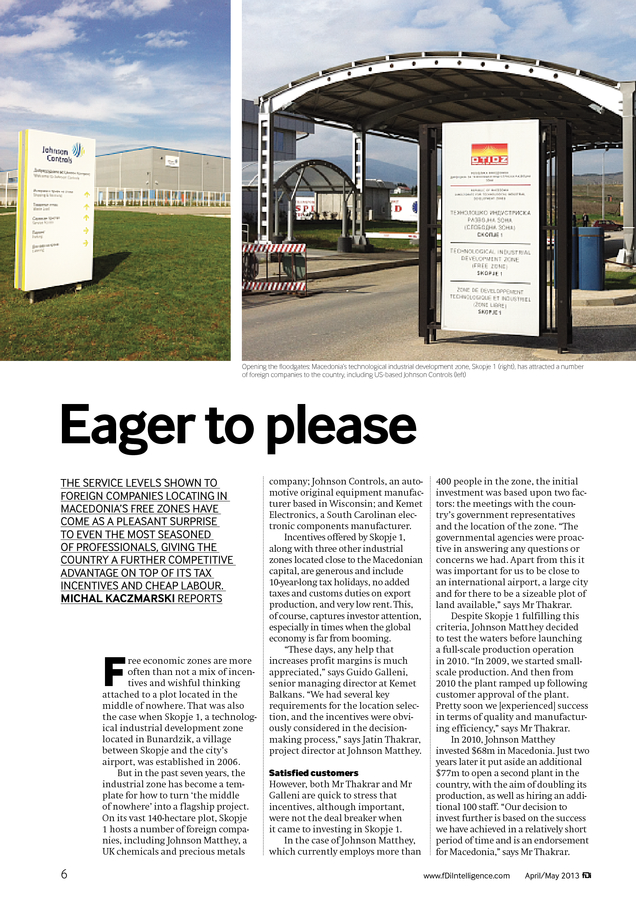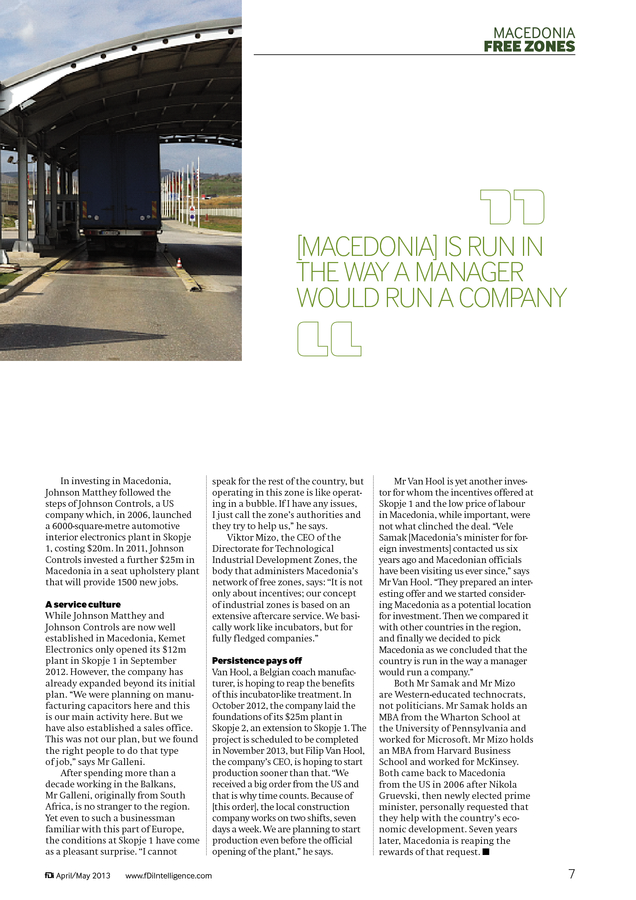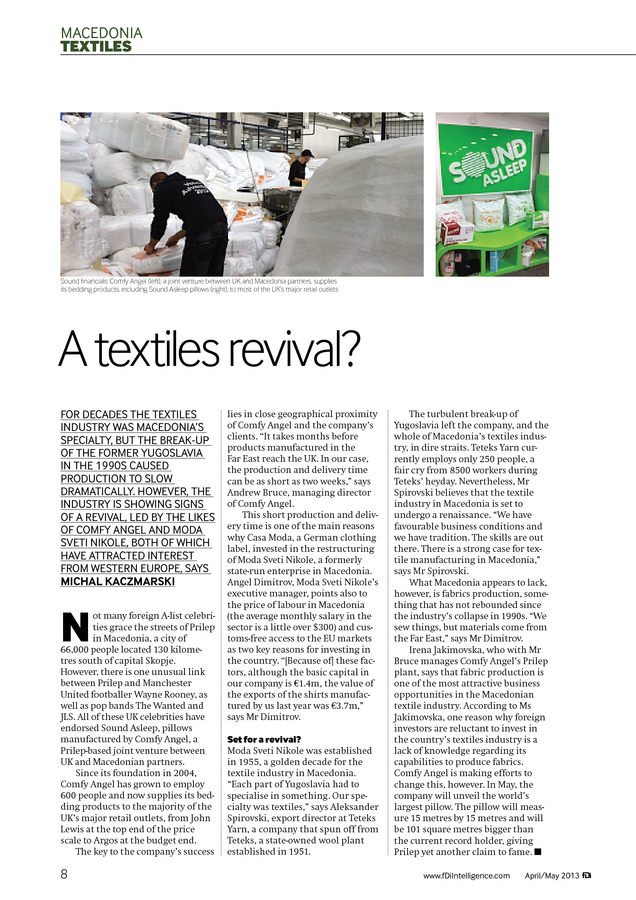




1) supplement www.fdiintelligence.com Macedonia Can a focus on the country’s glorious past bring future triumphs? produced by Suppcover-1212_Macedonia.indd 1 sponsored by 03/04/2013 09:27
2) CONTENTS Published by The Financial Times Ltd, Number One Southwark Bridge, London SE1 9HL, UK Tel: +44 (0)20 7873 3000. Editorial fax: +44 (0)1858 461873. Staff members can be contacted by dialing +44 (0)20 7775 followed by their extension number Editor-in-Chief Brian Caplen 6364 brian.caplen@ft.com Editor Courtney Fingar 6365 courtney.fingar@ft.com Senior Reporters/ Markets Editors Michal Kaczmarski 6848 michal.kaczmarski@ft.com Barbara Njau 6480 barbara.njau@ft.com Production Editor Richard Gardham 6367 richard.gardham@ft.com Deputy Production Editors Andrea Crisp 6338 andrea.crisp@ft.com Helen Wilson 6825 helen.wilson@ft.com Head of Design Gavin Brammall 4320 gavin.brammall@ft.com Advertisement executive Daniel Macklin 4120 daniel.macklin@ft.com International Sales Manager Chris Knight 6718 chris.knight@ft.com Associate Publisher Luke McGreevy +971 (0)4 391 4398 luke.mcgreevy@ft.com Financial Publishing Director Gavin Daly 7201 3517 gavin.daly@ft.com Publishing Director Angus Cushley 6354 angus.cushley@ft.com Head of Online Publishing & Marketing – Global Finance Davinia Powell 6449 davinia.powell@ft.com Controlled circulation Peter Culleton 4847 peter.culleton@ft.com Subscriptions/ Customer services CDS Global, Tower House, Lathkill Street, Sovereign Park, Market Harborough, Leics, UK. LE16 9EF ft@subscription.co.uk tel: 0845 456 1516 (customer services) 01858 438417 (overseas), fax: +44 (0)1858 461 873 One-year subscription rates £345 for fDi Magazine and full access to fDiIntelligence.com; £315 for fDi Magazine only Please contact us for details of other currencies Registered Number: 227590 (England and Wales) ISSN: 1476-301X © Financial Times Ltd 2013. FDI is a trademark of Financial Times Ltd 2013. “Financial Times” and “FT” are registered trademarks and service marks of the Financial Times Ltd. All rights reserved. No part of this publication may be reproduced or used in any form of advertising without prior permission in writing from the editor. No responsibility for loss occasioned to any person acting or refraining from acting as a result of material in this publication can be accepted. On any specific matter, reference should be made to an appropriate adviser. Registered Office: Number One Southwark Bridge, London SE1 9HL, UK Reprints are available of any fDi Magazine article, with your company logo and contact details inserted if required (minimum order 100 copies). For details telephone 0207 873 4816. For one-off copyright licences for reproduction of fDi magazine articles telephone 0207 873 4871. Alternatively, for both services e-mail synd.admin@ft.com April/May 2013 www.fDiIntelligence.com OvErviEw 02 The republic of Macedonia has undergone a radical transformation in recent years thanks to its government’s efforts to revitalise the country’s economy, business environment and the look of its capital city, Skopje. The result is new buildings, new businesses and record inflows of FDI. Michal Kaczmarski reports. iCT 05 While some IT hotspots in central and eastern Europe are overheating, with rising demand leading to a hike in wage expectations, Macedonia is positioning itself to take advantage, investing in developing the IT expertise of its graduates and establishing a business incubator to assist new businesses. frEE zONES 06 The service levels shown to foreign companies locating in Macedonia’s free zones have come as a pleasant surprise to even the most seasoned of professionals, giving the country a further competitive advantage on top of its tax incentives and cheap labour. TExTilES 08 For decades the textiles industry was Macedonia’s specialty, but the break-up of the former Yugoslavia in the 1990s caused production to slow dramatically. However, the industry is showing signs of a revival, led by the likes of Comfy Angel and Moda Sveti Nikole, both of which have attracted interest from western Europe. 1
3) Overview Macedonia raises its game The republic of Macedonia has undergone a radical TransforMaTion in recenT years Thanks To iTs governMenT’s efforTs To reviTalise The counTry’s econoMy, business environMenT and The look of iTs capiTal ciTy, skopje. The resulT is new buildings, new businesses and record inflows of fdi. Michal KaczMarsKi reporTs S kopje, the capital of Macedonia, is in the midst of a transformation. The noise of excavators and heavy-duty trucks has become a familiar sound in the city centre as structures, including an eight-storey-high monument of Alexander the Great and a neoclassical building housing the country’s national museum – the Museum of Macedonian Struggle – are constructed as part of the government’s revitalisation project ‘Skopje 2014’, aimed at giving the city a more classical appeal by 2014. The government has also been taking steps to revitalise the country’s economy. When prime minister Nikola Gruevski was elected in 2006, Macedonia’s unemployment rate was nearly 40%, its GDP per capita was one of the lowest in Europe and the country ranked 81st in the World Bank’s Doing Business ranking. By 2012, the country had accelerated into 23rd place in the ranking, just behind Germany and ahead of Japan. Its FDI efforts have also witnessed much improvement. In 2012 alone, Skopje recorded a 900% year-on-year increase in inward FDI projects, one of the highest increases in the world, according to greenfield investment monitor fDi Markets. In the same year, Macedonia witnessed the second largest year-on-year growth in inward FDI globally. Good connections Macedonia’s appeal is down to a combination of factors, according to the country’s minister for foreign investments Vele Samak. ”In manufacturing, Macedonia offers Chinese-level wages with German quality of production. In shared services, the country offers Indian-level wages and European cultural proximity,” he says. With a population of just 2 million people, the country’s domestic market is relatively small but, according to Mr Samak, Macedonia is an attractive option for companies looking to nearshore production for European markets thanks to its position on two of Europe’s main transport corridors. The country also offers duty-free access to about 650 million customers, thanks to its membership in the World Trade Organisation and the Central European Free-Trade Agreement, as well as its free-trade agreements in 2012, Macedonia witnessed the second largest year-on-year growth in inward Fdi globally 2 www.fdiintelligence.com april/May 2013
4) in 2012 alone, skopje (pictured) recorded a 900% year-on-year increase in inward Fdi projects with Turkey and Ukraine. Its adoption of the Stabilisation and Association Agreement also grants products that are manufactured in the country customs-free access to the EU. Moreover, Macedonia’s integration into the EU goes beyond trade agreements. The country is an EU candidate state and, although factors such as the dispute with Greece over Macedonia’s name are likely to prevent it from joining in the near future, the country already applies EU standards when it comes to competition, procurement and corporate governance. ”Investing in Macedonia is similar to investing in the EU, but at a fraction of the price,” says Viktor Mizo, CEO of the Directorate for Technological Industrial Development Zones (Dtidz), which manages the country’s economic zones. Tax breaks Dtidz’s network of four economic free zones showcase how far Macedonia goes to attract foreign investments. These free zones offer incentives, including a 10-year tax holiday, exemption from utility taxes, free land building permits and financial help of up to €500,000 to cover construction costs. The country’s tax policies are also highly attractive to investors. A flat personal income tax april/May 2013 www.fdiintelligence.com rate of 10% is one of the lowest in Europe and, since 2009, companies registered in Macedonia do not have to pay tax on retained earnings, while real estate taxes do not exceed 5%. The country also has the necessary mechanisms in place to assure investors that their capital is safe. Macedonia has signed 30 bilateral investment agreements and the country’s constitution guarantees the free transfer and repatriation of capital, while legislation grants equal treatment to foreign and domestic companies. “The government supports business and the country’s legal system reflects that,” says Filip Ruben, a junior partner at Mens Legis, a Skopje-based law practice that has worked with international companies such as Siemens, Fiat and McDonald’s. Apart from Mens Legis, foreign investors can also access the services of global tax and law practices such as KPMG, PricewaterhouseCoopers, Ernst & Young and Grant Thornton, which all have a presence in the country. cOunTry prOfile Macedonia Population: 2.09 million Pop. growth rate: 0.24% area: 25,713 sq km real GdP growth: 1% GdP per capita: $10,700 current account: -$242m largest sector (% of GdP): services labour force: 936,000 Unemployment rate: 31.3% source: cia world factbook, 2013 Skopje Macedonia Helping hand In 2004, the country established Invest Macedonia, a governmental agency charged with promoting exports and investments in Macedonia. The agency’s CEO, Visar Fida, 3
5) Macedonia Overview the sky is the limit: construction work is taking place all over the Macedonian capital of skopje, as part of both the government’s revitalisation plan ‘skopje 2014’ (right) and private investment projects such as cevahir’s residential and shopping complex (left) says that it provides a wide range of services through its grapevine of 25 economic developers working within Macedonian embassies around the world. “The agency’s task is to work closely with potential investors to understand their investment projects, arrange an appropriate itinerary for them to visit Macedonia and to work on their behalf with governmental authorities to enable the fast start-up of operations. In this respect, the agency basically functions as a full-scale consulting agency, which offers its services free of charge,” says Mr Fida. As well as Invest Macedonia, foreign investors can also receive help from the Foreign Investors Council (FIC), a body within the Economic Chamber of Macedonia. “It is important to keep the dialogue going between private sector and government entities and that is what we are doing,” says Ljubica Nuri, FIC’s high counselor of the management board. “But we also want to be a place where businesses get to know each other and find new platforms of co-operation.” Although FIC has just three full-time employees, it has 98 corporate members and aims at being the focal point for the country’s business community. Eser Cevahir, the general manager of Turkish construction and investment group Cevahir Holding, is one of the newest members of the 4 the country’s business community. In June 2012, Cevahir started the construction of a complex comprising four 42-storey-high residential buildings and a shopping mall, in Skopje. “Getting the project up and running was not difficult and in most cases we could rely on the local supply chain and workers,” says Mr Cevahir. He is bullish that the $365m investment will bring returns, so much so that the company has already acquired another plot of land in Skopje. wanting more It is not just the country’s authorities that are welcoming this influx of new investment. Ajdovan Ademoski, one of the most successful businessmen in Macedonia, believes that more businesses are needed if the economy is to reach its full potential. “We need more investments and proof that people can be successful here,” he says. Mr Ademoski is also in the process of developing a residential complex as well as finalising an agreement with a major international hotel operator. This puts him in direct competition with Cevahir, but this does not worry him. “I am not afraid of the competition,” he says. According to Mr Ademoski, competition is a sign that the economy is growing and that Macedonia is becoming an increasingly attractive place in which to invest. â– www.fdiintelligence.com april/May 2013
6) Macedonia ICT the Macedonian workforce is becoMing increasingly skilled in ict the headquarters of Makedonski telekom in skopje, Macedonia. deutsche telekom has invested more than E360m in the company Switched on While soMe iT hoTspoTs in cenTral and easTern europe are overheaTing, WiTh rising deMand leading To a hike in Wage expecTaTions, Macedonia is posiTioning iTself To Take advanTage, invesTing in developing The iT experTise of iTs graduaTes and esTablishing a business incubaTor To assisT neW businesses. by Michal KaczMarsKi W hen it comes to investments in software, IT services and information and communications technology (ICT), the equation is simple. A young, trainable and relatively cheap workforce plus an IT infrastructure equals an attractive investment proposition. That is why central and eastern Europe has became a ‘go to’ location for these types of projects in the past decade. The problem is, the more popular a country becomes with investors, the more wages increase and the labour pool shrinks. It is for this reason that Macedonia – with an average monthly wage that is 49% lower than in Hungary and 91% lower than in Czech Republic, and almost half of its population under 30 – is fast establishing itself as an attractive destination for ICT projects. Attracting attention According to Antoni Peshev, the founder of Macedonia-based IT company Ultra Computer, the Macedonian workforce is becoming increasingly skilled in ICT. “Over the past 10 years, Macedonia has invested in the education of new ICT experts by april/May 2013 www.fdiintelligence.com supplying a computer for every student and offering subsidies to those buying new computer equipment. These efforts have increased the level of IT literacy, especially among the younger population,” he says. The skilled workforce is attracting foreign investment in the sector. According to data from greenfield investment monitor fDi Markets, the communications and IT sector was the third most popular sector for investment in the country in 2012, behind food and tobacco, and textiles. UK-based call recording company Retell is among the foreign companies that launched a project in the Macedonian communications and IT sector in 2012. “We started looking for a nearshoring location at the beginning of 2011. One year later, our operations in Macedonia were up and running,” says Richard Herman, the chairman of Retell. In this time, Retell managed to find a local partner, office space within Skopje’s Youth Entrepreneurial Service incubator and seven fulltime employees. “The country is well run and the government seems to be more busi- ness friendly than in the UK. So far, so good,” says Mr Herman. Flicking the switch One of the most significant investors in the Macedonian ICT sector has been German telecommunications firm Deutsche Telekom, the holding company of mobile communications firm T-Mobile. In 2001, Deutsche Telekom acquired majority ownership of the Macedonian state-owned telecoms company Makedonski Telekom through its Hungarian subsidiary Magyar Telekom. “It was Magyar Telekom’s first international venture and with an investment of €360m, the company certainly took some risks,” says Daniel Szasz, CEO of Makedonski Telekom and president of the board of T-Mobile. As well as being a landmark deal for the company, it was also the biggest privatisation deal in Macedonia’s history. More than a decade on, the company remains one of the most significant players in the Macedonian IT sector. “Macedonia has been chosen by Deutsche Telekom as the first country to switch from the circuit-board telephone network to the internet-based network,” says Mr Szasz. “The project is expected to be completed by the end of 2013, and is [reliant on] significant investments. It would not have happened if Macedonia was not considered as a good place for investment in that sector.” â– 5
7) Opening the floodgates: Macedonia’s technological industrial development zone, Skopje 1 (right), has attracted a number of foreign companies to the country, including US-based Johnson Controls (left) Eager to please The service levels shown To foreign companies locaTing in macedonia’s free zones have come as a pleasanT surprise To even The mosT seasoned of professionals, giving The counTry a furTher compeTiTive advanTage on Top of iTs Tax incenTives and cheap labour. Michal KaczMarsKi reporTs F ree economic zones are more often than not a mix of incentives and wishful thinking attached to a plot located in the middle of nowhere. That was also the case when Skopje 1, a technological industrial development zone located in Bunardzik, a village between Skopje and the city’s airport, was established in 2006. But in the past seven years, the industrial zone has become a template for how to turn ‘the middle of nowhere’ into a flagship project. On its vast 140-hectare plot, Skopje 1 hosts a number of foreign companies, including Johnson Matthey, a UK chemicals and precious metals 6 company; Johnson Controls, an automotive original equipment manufacturer based in Wisconsin; and Kemet Electronics, a South Carolinan electronic components manufacturer. Incentives offered by Skopje 1, along with three other industrial zones located close to the Macedonian capital, are generous and include 10-year-long tax holidays, no added taxes and customs duties on export production, and very low rent. This, of course, captures investor attention, especially in times when the global economy is far from booming. “These days, any help that increases profit margins is much appreciated,” says Guido Galleni, senior managing director at Kemet Balkans. “We had several key requirements for the location selection, and the incentives were obviously considered in the decisionmaking process,” says Jatin Thakrar, project director at Johnson Matthey. Satisfied customers However, both Mr Thakrar and Mr Galleni are quick to stress that incentives, although important, were not the deal breaker when it came to investing in Skopje 1. In the case of Johnson Matthey, which currently employs more than 400 people in the zone, the initial investment was based upon two factors: the meetings with the country’s government representatives and the location of the zone. “The governmental agencies were proactive in answering any questions or concerns we had. Apart from this it was important for us to be close to an international airport, a large city and for there to be a sizeable plot of land available,” says Mr Thakrar. Despite Skopje 1 fulfilling this criteria, Johnson Matthey decided to test the waters before launching a full-scale production operation in 2010. “In 2009, we started smallscale production. And then from 2010 the plant ramped up following customer approval of the plant. Pretty soon we [experienced] success in terms of quality and manufacturing efficiency,” says Mr Thakrar. In 2010, Johnson Matthey invested $68m in Macedonia. Just two years later it put aside an additional $77m to open a second plant in the country, with the aim of doubling its production, as well as hiring an additional 100 staff. “Our decision to invest further is based on the success we have achieved in a relatively short period of time and is an endorsement for Macedonia,” says Mr Thakrar. www.fdiintelligence.com april/may 2013
8) macedonia free zoneS [MaCedOnia] iS rUn in the way a Manager wOUld rUn a COMpany In investing in Macedonia, Johnson Matthey followed the steps of Johnson Controls, a US company which, in 2006, launched a 6000-square-metre automotive interior electronics plant in Skopje 1, costing $20m. In 2011, Johnson Controls invested a further $25m in Macedonia in a seat upholstery plant that will provide 1500 new jobs. A service culture While Johnson Matthey and Johnson Controls are now well established in Macedonia, Kemet Electronics only opened its $12m plant in Skopje 1 in September 2012. However, the company has already expanded beyond its initial plan. “We were planning on manufacturing capacitors here and this is our main activity here. But we have also established a sales office. This was not our plan, but we found the right people to do that type of job,” says Mr Galleni. After spending more than a decade working in the Balkans, Mr Galleni, originally from South Africa, is no stranger to the region. Yet even to such a businessman familiar with this part of Europe, the conditions at Skopje 1 have come as a pleasant surprise. “I cannot april/may 2013 www.fdiintelligence.com speak for the rest of the country, but operating in this zone is like operating in a bubble. If I have any issues, I just call the zone’s authorities and they try to help us,” he says. Viktor Mizo, the CEO of the Directorate for Technological Industrial Development Zones, the body that administers Macedonia’s network of free zones, says: “It is not only about incentives; our concept of industrial zones is based on an extensive aftercare service. We basically work like incubators, but for fully fledged companies.” Persistence pays off Van Hool, a Belgian coach manufacturer, is hoping to reap the benefits of this incubator-like treatment. In October 2012, the company laid the foundations of its $25m plant in Skopje 2, an extension to Skopje 1. The project is scheduled to be completed in November 2013, but Filip Van Hool, the company’s CEO, is hoping to start production sooner than that. “We received a big order from the US and that is why time counts. Because of [this order], the local construction company works on two shifts, seven days a week. We are planning to start production even before the official opening of the plant,” he says. Mr Van Hool is yet another investor for whom the incentives offered at Skopje 1 and the low price of labour in Macedonia, while important, were not what clinched the deal. “Vele Samak [Macedonia’s minister for foreign investments] contacted us six years ago and Macedonian officials have been visiting us ever since,” says Mr Van Hool. “They prepared an interesting offer and we started considering Macedonia as a potential location for investment. Then we compared it with other countries in the region, and finally we decided to pick Macedonia as we concluded that the country is run in the way a manager would run a company.” Both Mr Samak and Mr Mizo are Western-educated technocrats, not politicians. Mr Samak holds an MBA from the Wharton School at the University of Pennsylvania and worked for Microsoft. Mr Mizo holds an MBA from Harvard Business School and worked for McKinsey. Both came back to Macedonia from the US in 2006 after Nikola Gruevski, then newly elected prime minister, personally requested that they help with the country’s economic development. Seven years later, Macedonia is reaping the rewards of that request. â– 7
9) Macedonia TexTiles Sound financials: Comfy Angel (left), a joint venture between UK and Macedonia partners, supplies its bedding products, including Sound Asleep pillows (right), to most of the UK’s major retail outlets A textiles revival? For decades the textiles industry was Macedonia’s specialty, but the break-up oF the ForMer yugoslavia in the 1990s caused production to slow draMatically. however, the industry is showing signs oF a revival, led by the likes oF coMFy angel and Moda sveti nikole, both oF which have attracted interest FroM western europe, says Michal KaczMarsKi N ot many foreign A-list celebrities grace the streets of Prilep in Macedonia, a city of 66,000 people located 130 kilometres south of capital Skopje. However, there is one unusual link between Prilep and Manchester United footballer Wayne Rooney, as well as pop bands The Wanted and JLS. All of these UK celebrities have endorsed Sound Asleep, pillows manufactured by Comfy Angel, a Prilep-based joint venture between UK and Macedonian partners. Since its foundation in 2004, Comfy Angel has grown to employ 600 people and now supplies its bedding products to the majority of the UK’s major retail outlets, from John Lewis at the top end of the price scale to Argos at the budget end. The key to the company’s success 8 lies in close geographical proximity of Comfy Angel and the company’s clients. “It takes months before products manufactured in the Far East reach the UK. In our case, the production and delivery time can be as short as two weeks,” says Andrew Bruce, managing director of Comfy Angel. This short production and delivery time is one of the main reasons why Casa Moda, a German clothing label, invested in the restructuring of Moda Sveti Nikole, a formerly state-run enterprise in Macedonia. Angel Dimitrov, Moda Sveti Nikole’s executive manager, points also to the price of labour in Macedonia (the average monthly salary in the sector is a little over $300) and customs-free access to the EU markets as two key reasons for investing in the country. “[Because of] these factors, although the basic capital in our company is €1.4m, the value of the exports of the shirts manufactured by us last year was €3.7m,” says Mr Dimitrov. set for a revival? Moda Sveti Nikole was established in 1955, a golden decade for the textile industry in Macedonia. “Each part of Yugoslavia had to specialise in something. Our specialty was textiles,” says Aleksander Spirovski, export director at Teteks Yarn, a company that spun off from Teteks, a state-owned wool plant established in 1951. The turbulent break-up of Yugoslavia left the company, and the whole of Macedonia’s textiles industry, in dire straits. Teteks Yarn currently employs only 250 people, a fair cry from 8500 workers during Teteks’ heyday. Nevertheless, Mr Spirovski believes that the textile industry in Macedonia is set to undergo a renaissance. “We have favourable business conditions and we have tradition. The skills are out there. There is a strong case for textile manufacturing in Macedonia,” says Mr Spirovski. What Macedonia appears to lack, however, is fabrics production, something that has not rebounded since the industry’s collapse in 1990s. “We sew things, but materials come from the Far East,” says Mr Dimitrov. Irena Jakimovska, who with Mr Bruce manages Comfy Angel’s Prilep plant, says that fabric production is one of the most attractive business opportunities in the Macedonian textile industry. According to Ms Jakimovska, one reason why foreign investors are reluctant to invest in the country’s textiles industry is a lack of knowledge regarding its capabilities to produce fabrics. Comfy Angel is making efforts to change this, however. In May, the company will unveil the world’s largest pillow. The pillow will measure 15 metres by 15 metres and will be 101 square metres bigger than the current record holder, giving Prilep yet another claim to fame. â– www.fdiintelligence.com april/May 2013


